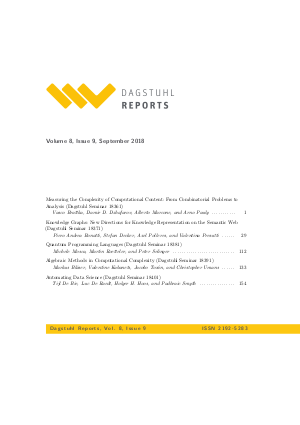Dagstuhl Reports, Volume 8, Issue 9
-
Part of:
Volume:
Dagstuhl Reports, Volume 8
Journal: Dagstuhl Reports (DagRep)

Event
- Dagstuhl Seminars 18361, 18371, 18381, 18391, 18401
Publication Details
- published at: 2019-06-18
- Publisher: Schloss Dagstuhl – Leibniz-Zentrum für Informatik
- DBLP: db/journals/dagstuhl-reports/dagstuhl-reports8
Access Numbers
- Detailed Access Statistics available here
-
Total Document Accesses (updated on a weekly basis):
0PDF Downloads
Documents
Dagstuhl Reports, Volume 8, Issue 9, September 2018, Complete Issue
Abstract
Cite as
Dagstuhl Reports, Volume 8, Issue 9, Schloss Dagstuhl – Leibniz-Zentrum für Informatik (2019)
Copy BibTex To Clipboard
@Article{DagRep.8.9,
title = {{Dagstuhl Reports, Volume 8, Issue 9, September 2018, Complete Issue}},
journal = {Dagstuhl Reports},
ISSN = {2192-5283},
year = {2019},
volume = {8},
number = {9},
publisher = {Schloss Dagstuhl -- Leibniz-Zentrum f{\"u}r Informatik},
address = {Dagstuhl, Germany},
URL = {https://drops.dagstuhl.de/entities/document/10.4230/DagRep.8.9},
URN = {urn:nbn:de:0030-drops-105602},
doi = {10.4230/DagRep.8.9},
annote = {Keywords: Dagstuhl Reports, Volume 8, Issue 9, September 2018, Complete Issue}
}
Dagstuhl Reports, Table of Contents, Volume 8, Issue 9, 2018
Abstract
Cite as
Dagstuhl Reports, Volume 8, Issue 9, pp. i-ii, Schloss Dagstuhl – Leibniz-Zentrum für Informatik (2019)
Copy BibTex To Clipboard
@Article{DagRep.8.9.i,
title = {{Dagstuhl Reports, Table of Contents, Volume 8, Issue 9, 2018}},
pages = {i--ii},
journal = {Dagstuhl Reports},
ISSN = {2192-5283},
year = {2019},
volume = {8},
number = {9},
publisher = {Schloss Dagstuhl -- Leibniz-Zentrum f{\"u}r Informatik},
address = {Dagstuhl, Germany},
URL = {https://drops.dagstuhl.de/entities/document/10.4230/DagRep.8.9.i},
URN = {urn:nbn:de:0030-drops-105599},
doi = {10.4230/DagRep.8.9.i},
annote = {Keywords: Table of Contents, Frontmatter}
}
Measuring the Complexity of Computational Content: From Combinatorial Problems to Analysis (Dagstuhl Seminar 18361)
Abstract
Cite as
Vasco Brattka, Damir D. Dzhafarov, Alberto Marcone, and Arno Pauly. Measuring the Complexity of Computational Content: From Combinatorial Problems to Analysis (Dagstuhl Seminar 18361). In Dagstuhl Reports, Volume 8, Issue 9, pp. 1-28, Schloss Dagstuhl – Leibniz-Zentrum für Informatik (2019)
Copy BibTex To Clipboard
@Article{brattka_et_al:DagRep.8.9.1,
author = {Brattka, Vasco and Dzhafarov, Damir D. and Marcone, Alberto and Pauly, Arno},
title = {{Measuring the Complexity of Computational Content: From Combinatorial Problems to Analysis (Dagstuhl Seminar 18361)}},
pages = {1--28},
journal = {Dagstuhl Reports},
ISSN = {2192-5283},
year = {2019},
volume = {8},
number = {9},
editor = {Brattka, Vasco and Dzhafarov, Damir D. and Marcone, Alberto and Pauly, Arno},
publisher = {Schloss Dagstuhl -- Leibniz-Zentrum f{\"u}r Informatik},
address = {Dagstuhl, Germany},
URL = {https://drops.dagstuhl.de/entities/document/10.4230/DagRep.8.9.1},
URN = {urn:nbn:de:0030-drops-103270},
doi = {10.4230/DagRep.8.9.1},
annote = {Keywords: Computability and complexity in analysis, computations on real numbers, reducibilities, descriptive complexity, computational complexity, reverse and}
}
Knowledge Graphs: New Directions for Knowledge Representation on the Semantic Web (Dagstuhl Seminar 18371)
Abstract
Cite as
Piero Andrea Bonatti, Stefan Decker, Axel Polleres, and Valentina Presutti. Knowledge Graphs: New Directions for Knowledge Representation on the Semantic Web (Dagstuhl Seminar 18371). In Dagstuhl Reports, Volume 8, Issue 9, pp. 29-111, Schloss Dagstuhl – Leibniz-Zentrum für Informatik (2019)
Copy BibTex To Clipboard
@Article{bonatti_et_al:DagRep.8.9.29,
author = {Bonatti, Piero Andrea and Decker, Stefan and Polleres, Axel and Presutti, Valentina},
title = {{Knowledge Graphs: New Directions for Knowledge Representation on the Semantic Web (Dagstuhl Seminar 18371)}},
pages = {29--111},
journal = {Dagstuhl Reports},
ISSN = {2192-5283},
year = {2019},
volume = {8},
number = {9},
editor = {Bonatti, Piero Andrea and Decker, Stefan and Polleres, Axel and Presutti, Valentina},
publisher = {Schloss Dagstuhl -- Leibniz-Zentrum f{\"u}r Informatik},
address = {Dagstuhl, Germany},
URL = {https://drops.dagstuhl.de/entities/document/10.4230/DagRep.8.9.29},
URN = {urn:nbn:de:0030-drops-103283},
doi = {10.4230/DagRep.8.9.29},
annote = {Keywords: knowledge graphs, knowledge representation, linked data, ontologies, semantic web}
}
Quantum Programming Languages (Dagstuhl Seminar 18381)
Abstract
Cite as
Michele Mosca, Martin Roetteler, and Peter Selinger. Quantum Programming Languages (Dagstuhl Seminar 18381). In Dagstuhl Reports, Volume 8, Issue 9, pp. 112-132, Schloss Dagstuhl – Leibniz-Zentrum für Informatik (2019)
Copy BibTex To Clipboard
@Article{mosca_et_al:DagRep.8.9.112,
author = {Mosca, Michele and Roetteler, Martin and Selinger, Peter},
title = {{Quantum Programming Languages (Dagstuhl Seminar 18381)}},
pages = {112--132},
journal = {Dagstuhl Reports},
ISSN = {2192-5283},
year = {2019},
volume = {8},
number = {9},
editor = {Mosca, Michele and Roetteler, Martin and Selinger, Peter},
publisher = {Schloss Dagstuhl -- Leibniz-Zentrum f{\"u}r Informatik},
address = {Dagstuhl, Germany},
URL = {https://drops.dagstuhl.de/entities/document/10.4230/DagRep.8.9.112},
URN = {urn:nbn:de:0030-drops-103291},
doi = {10.4230/DagRep.8.9.112},
annote = {Keywords: compilers, functional programming, quantum computing, reversible computing, verification}
}
Algebraic Methods in Computational Complexity (Dagstuhl Seminar 18391)
Abstract
Cite as
Markus Bläser, Valentine Kabanets, Jacobo Torán, and Christopher Umans. Algebraic Methods in Computational Complexity (Dagstuhl Seminar 18391). In Dagstuhl Reports, Volume 8, Issue 9, pp. 133-153, Schloss Dagstuhl – Leibniz-Zentrum für Informatik (2019)
Copy BibTex To Clipboard
@Article{blaser_et_al:DagRep.8.9.133,
author = {Bl\"{a}ser, Markus and Kabanets, Valentine and Tor\'{a}n, Jacobo and Umans, Christopher},
title = {{Algebraic Methods in Computational Complexity (Dagstuhl Seminar 18391)}},
pages = {133--153},
journal = {Dagstuhl Reports},
ISSN = {2192-5283},
year = {2019},
volume = {8},
number = {9},
editor = {Bl\"{a}ser, Markus and Kabanets, Valentine and Tor\'{a}n, Jacobo and Umans, Christopher},
publisher = {Schloss Dagstuhl -- Leibniz-Zentrum f{\"u}r Informatik},
address = {Dagstuhl, Germany},
URL = {https://drops.dagstuhl.de/entities/document/10.4230/DagRep.8.9.133},
URN = {urn:nbn:de:0030-drops-103438},
doi = {10.4230/DagRep.8.9.133},
annote = {Keywords: computational complexity, algebra, (de-) randomization, circuits, coding, lower bounds}
}
Automating Data Science (Dagstuhl Seminar 18401)
Abstract
Cite as
Tijl De Bie, Luc De Raedt, Holger H. Hoos, and Padhraic Smyth. Automating Data Science (Dagstuhl Seminar 18401). In Dagstuhl Reports, Volume 8, Issue 9, pp. 154-181, Schloss Dagstuhl – Leibniz-Zentrum für Informatik (2019)
Copy BibTex To Clipboard
@Article{debie_et_al:DagRep.8.9.154,
author = {De Bie, Tijl and De Raedt, Luc and Hoos, Holger H. and Smyth, Padhraic},
title = {{Automating Data Science (Dagstuhl Seminar 18401)}},
pages = {154--181},
journal = {Dagstuhl Reports},
ISSN = {2192-5283},
year = {2019},
volume = {8},
number = {9},
editor = {De Bie, Tijl and De Raedt, Luc and Hoos, Holger H. and Smyth, Padhraic},
publisher = {Schloss Dagstuhl -- Leibniz-Zentrum f{\"u}r Informatik},
address = {Dagstuhl, Germany},
URL = {https://drops.dagstuhl.de/entities/document/10.4230/DagRep.8.9.154},
URN = {urn:nbn:de:0030-drops-103443},
doi = {10.4230/DagRep.8.9.154},
annote = {Keywords: artificial intelligence, automated machine learning, automated scientific discovery, data science, inductive programming}
}